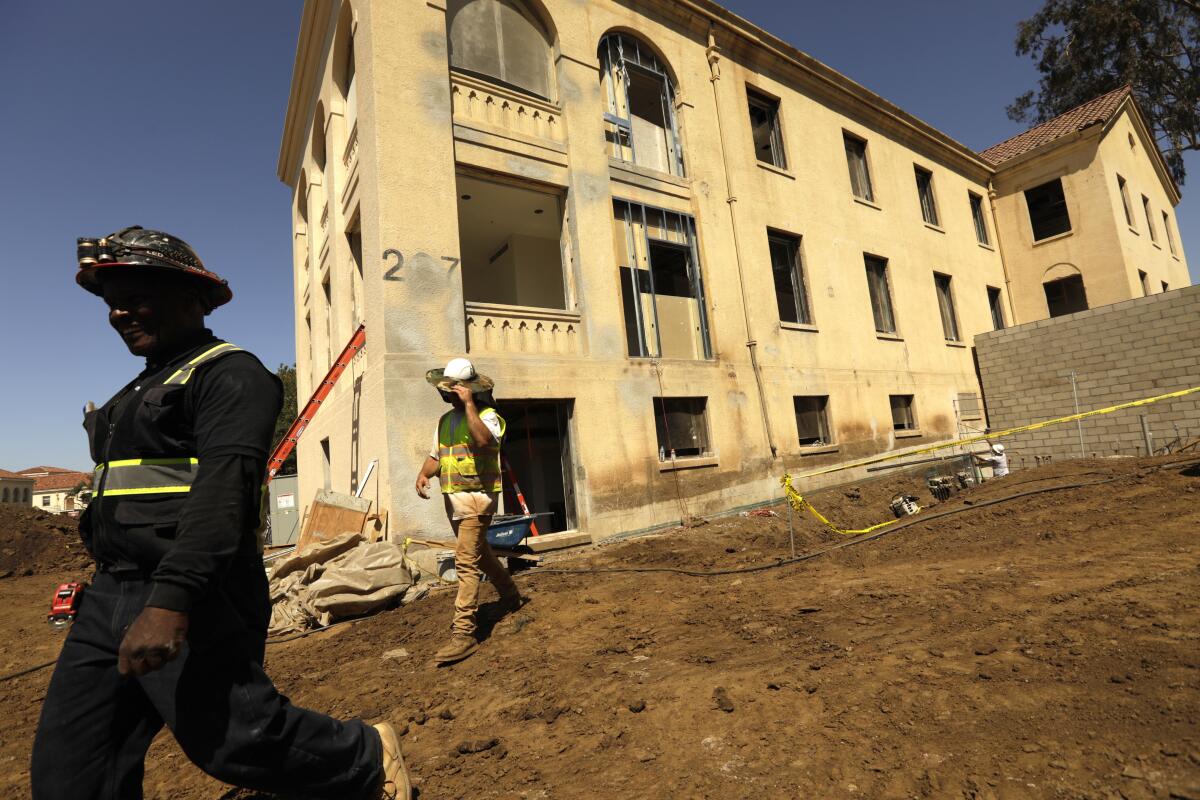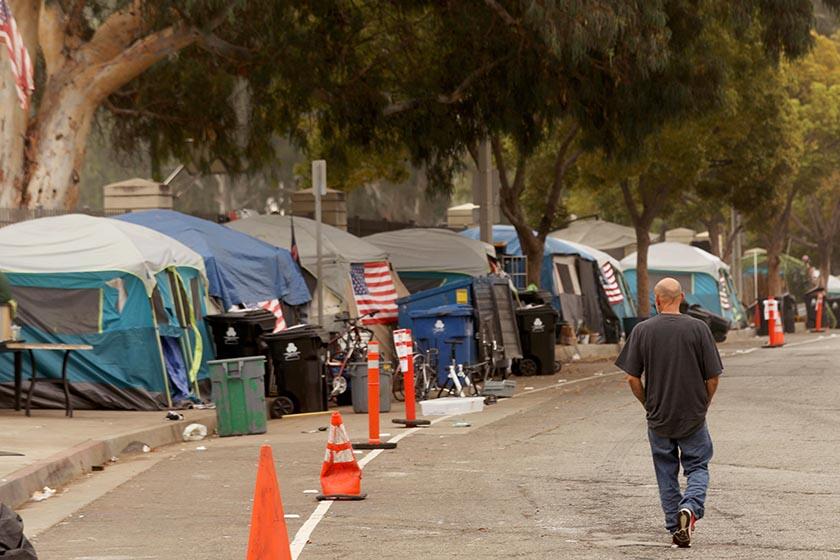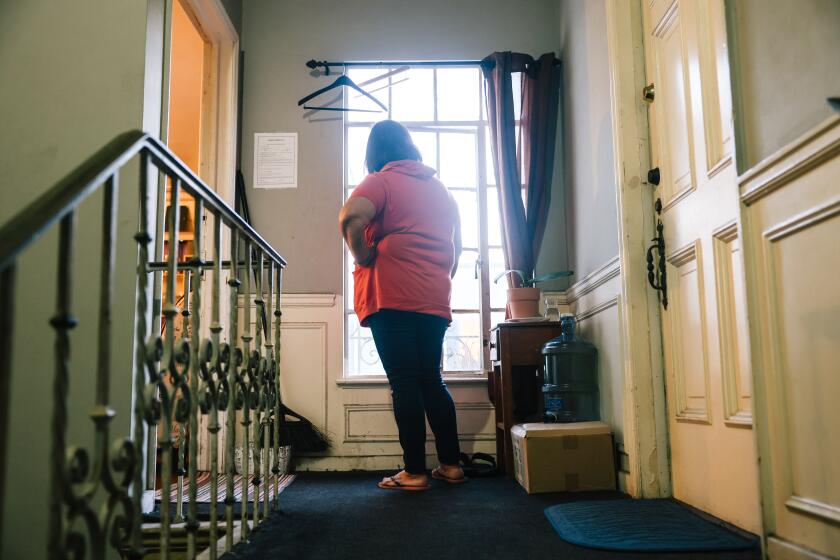Veterans’ demand for more housing in West Los Angeles to go forward in federal court

Concurring with arguments by several prominent constitutional and civil rights scholars, a federal judge has reversed himself and ruled that veterans can sue the Department of Veterans Affairs for housing they need to access healthcare and other VA benefits.
In a far-reaching ruling, U.S. District Judge David O. Carter also found that the leases of portions of the VA’s West Los Angeles Campus to UCLA and a private school are not in compliance with the congressional requirement to “provide services that principally benefit veterans and their families.”
“It’s a historic ruling,” said Mark Rosenbaum , an attorney with the pro bono law firm Public Counsel, one of four firms that represented veterans in the case. “I think it’s the beginning of the end of veterans homelessness in Los Angeles and the nation.”
Carter urged lawyers representing the VA to reach a settlement with plaintiffs who are seeking to rewrite or suspend those leases and are demanding that the VA produce 3,700 units of housing within six months either on the campus or in leased housing nearby. Carter set a scheduling conference for Jan. 4 and said he would foresee a trial in June or July if the parties can’t reach an agreement.
“My hope is that this case never sees the inside of a courtroom again,” Rosenbaum said. “But if they are going to continue their war on veterans we’re going to go to court and we’re going to win.”
The lawsuit reprised an earlier one that ended with a 2015 agreement by the VA to build 1,200 units of housing on the campus with a commitment to complete more than 770 by the end of 2022. Only 54 of those units were completed by then, and by September only 233 were available.
A lawsuit filed on behalf of homeless veterans demands that Veterans Affairs provide more permanent housing in and around its West L.A. campus.
In a statement to The Times, a spokesperson said the VA does not comment on pending litigation but added that the agency has provided 1,464 homeless veterans with permanent housing this year and invested nearly $140 million over the past three years on infrastructure for the construction of the 1,200 units.
In filing the new lawsuit on behalf of 14 veterans in November, Rosenbaum acknowledged that the failure to include mechanisms to enforce that earlier agreement was an error. Public Counsel was joined by the Inner City Law Center, Brown Goldstein & Levy LLP and Robbins Kaplan LLP.
An amended complaint broadened the case to a class action and added the U.S. Department of Urban Development and the Housing Authority of the City of Los Angeles as defendants, alleging that their policies provide too few rental subsidy vouchers for veterans while denying many disabled veterans access to the rent-restricted housing being constructed on the campus.
Veterans who receive disability are disqualified because the payments put them above the income threshold for apartments restricted to people making less than 30% of the area median income.
A tentative ruling issued by Carter in September found that the VA had a fiduciary duty to use the West LA campus primarily for housing and healthcare for disabled veterans but rejected, on technical grounds, the veterans’ claim that they could sue for housing under the federal Rehabilitation Act.
Carter said he tentatively agreed with lawyers representing the federal government that the Veterans’ Judicial Review Act, which created a separate court system to adjudicate veterans’ benefits claims, precludes the federal court from hearing claims under the Rehabilitation and Administrative Procedures acts.
The Ellis Act has allowed thousands of L.A.’s rent-stabilized units to be taken off the market. A mother and son who fought back want others to know they can too.
However, after hearing oral arguments in September, he said he was likely to change his opinion and ordered the parties to file written arguments.
Lawyers for the veterans group Swords to Plowshares and the American Civil Liberties Union then filed friends of the court briefs in the case contending that the ruling would effectively deny veterans the right to use the courts to pursue injunctive relief for grievances over systemwide failures rather than the individual benefits covered by the veterans court.
“As a veterans service organization and advocacy group, some of the work that Swords to Plowshares does is in federal district court,” said the group’s attorney, Peter E. Perkowski. “It’s important for us to preserve access to that forum when the alternatives are unavailable or insufficient to provide relief for the clients and communities we serve.”
Seven prominent legal scholars including UC Berkeley Law School dean Erwin Chemerinsky and Harvard Law School professor Laurence H. Tribe joined in a friend of the court brief filed by the national ACLU.
Other scholars in the group were Yale Law School professors Michael J. Wishnie and Judith Resnik, USC Gould School of Law professor Adam Zimmerman, UCLA Law School professor David Marcus and Stanford Law School professor Pamela S. Karlan.
“You couldn’t come up with six or seven scholars of higher repute,” Rosenbaum said. “It’s obvious the court paid attention to what they have to say.”
The ACLU brief argued that the government’s position “would deprive Plaintiffs of a meaningful forum to air their claims,” adding, “the VA lacks the power to issue the full remedies Congress authorized for violations of the Rehabilitation Act.”
In a 41-page order, Carter emphatically sided with those arguments, as well as the plaintiff’s right to sue the federal and local housing agencies for discrimination on the basis of disability.
“Perversely,” he wrote, “the more disabled a veteran, the less likely they are to receive a HUD-VASH voucher and become housed.”
He also addressed the VA leases which he had not mentioned in the tentative ruling. The government, he wrote, had “not demonstrated that the Brentwood School leases 21 acres of athletic facilities in order to benefit veterans, rather than to provide premier athletic facilities for their students.”
If the lease was found to be consistent with the intent of Congress, “the entire West LA campus could be dismembered by private entities that provide marginal benefits to veterans,” he wrote.
Carter’s order directly addressed leases to the Brentwood school, a parking lot and an oil drilling operation. He did not mention UCLA, which built a baseball field on the VA property.
Rosenbaum said UCLA would be included in the settlement talks.
“We’re going to litigate all the leases,” he said. “They’re an example of the VA putting the interest of college baseball players and affluent high school students over the veterans who serve this nation.”
Though the lawsuit did not make a specific demand to amend or invalidate the leases, those demands will be on the table, said Rob Reynolds, a veterans’ housing advocate who has assisted in the lawsuit.
“I personally would like to see the leases invalidated,” Reynolds said. “The VA has been leasing off land that’s meant for housing decades and decades.”
Carter, who disclosed his status as a Marine veteran early in the case and has taken a hands-on role in a lengthy case that is forcing Los Angeles city and county to increase their homelessness initiatives, began his written analysis with an impassioned statement of the government’s failure to adequately address veteran homelessness.
“The number of unhoused veterans in Los Angeles is particularly shocking, even in the larger context of the area’s ongoing housing and homelessness crises, because the city boasts a unique property that was historically dedicated to housing veterans with disabilities,” he wrote.
Since the initial settlement of the lawsuit in 2015, he added “the number of unhoused veterans in the area has more than tripled. It is unclear how many veterans have died on the streets of Los Angeles during that time, never having received housing or services.”
During a hearing Thursday, Carter posed provocative questions to the attorneys and, at one point, hearkened to a time when the VA had thousands of veterans living there.
“Why isn’t this a home, a campus again for up to 4,000 or 3,000 people?” he asked.
In a lengthy closing soliloquy, he became philosophical.
Noting that all recent veterans were volunteers, he asked, “Do we owe a greater duty or not? By avoiding the draft, does that change the contractual relationship in terms of a fiduciary duty? Ask yourself that question.”
On the other hand, Vietnam veterans don’t have time to wait.
“If we stall this out, there’s a whole generation of people in their 70s and 80s who will just pass away without this issue being decided.”
He closed with a call to urgency.
“We’re the homeless veteran capital of the world right now,” he said. “So I don’t want to hear excuses about we can’t afford it. It’s the opposite. We can’t afford what’s happening right now, folks. That’s what we can’t afford.”
More to Read
Sign up for Essential California
The most important California stories and recommendations in your inbox every morning.
You may occasionally receive promotional content from the Los Angeles Times.












